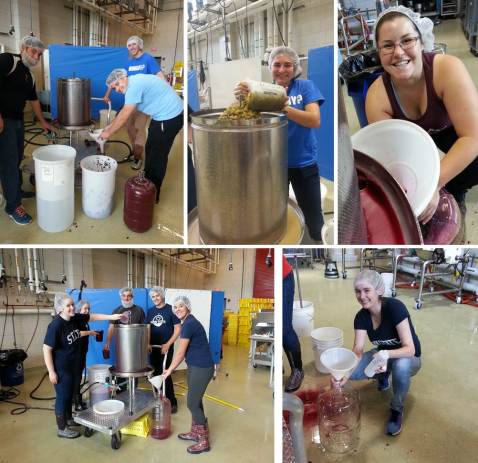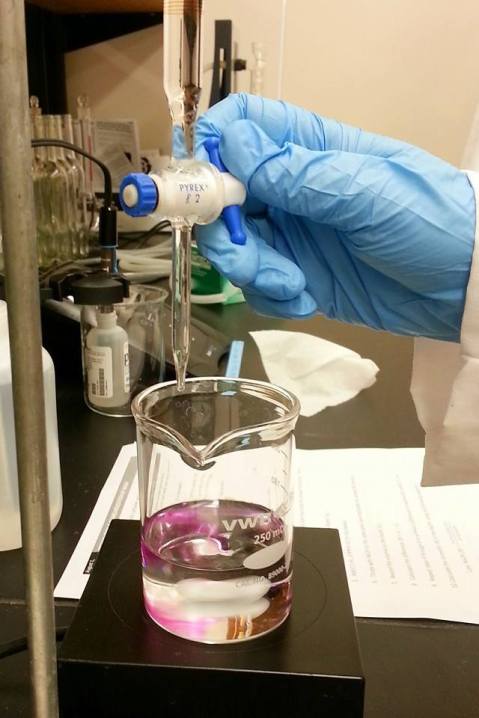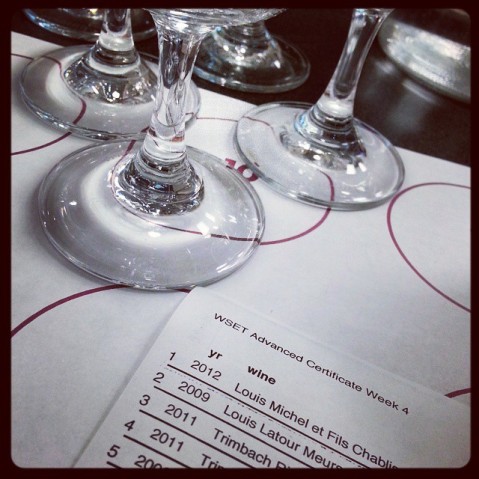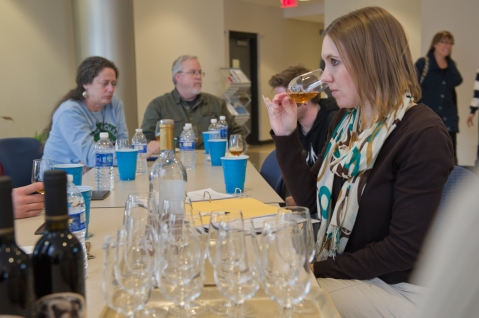What is Enology?
By: Denise M. Gardner
By definition, (o)enology is the study of wine and winemaking (Robinson 2006). The field of enology differs from that of viticulture, the science of grape growing, although the two are often intertwined in academic departments across the United States.
An (o)enologist is one that practices the field of (o)enology, and often understands the scientific principles associated with winemaking, including desirable characteristics associated with the grape itself. Enologists tend to understand wine analysis and can make educated decisions during wine production based on the analytical description and, potentially, sensory description of a given wine. Many enologists do not actually have a degree in “enology” per se, although enology degree programs exist throughout the world. In fact, many industry enologists have a science degree in chemistry, microbiology, biology, food science or another related field.
I find myself often making the argument that an enologist is actually a food scientist that specializes in the production of wine. While it may appear less glamorous in words, many enologists that have studied in the U.S. have Bachelors of Science degrees from institutions in which “enology” is embedded within the food science department. While the art of crafting a quality wine is unique to the product, and can require years of adequate sensory training or experience, the equipment and production techniques associated with winemaking are also utilized in the commercial production of many food and beverage products.

Penn State Food Science undergraduate students learn pilot scale research winemaking techniques associated with commercial winemaking practices and enology. Photo by: Denise M. Gardner
What does an (o)enologist do?
Being an enologist does not necessarily indicate that that individual is also the winemaker. In the book, “How to Launch Your Wine Career,” the authors (Thatch and D’Emilio 2009) explain the two arms associated with wine production in California: the winemaker and the enologist. For a head winemaker position, one typically has to work up the ladder from assistant winemaker, and may find themselves in several assistant winemaker positions prior to holding a head winemaker position. The enologist position develops through a different ladder within the winery: from a crush (or harvest) intern to a cellar worker to a lab assistant and finally a cellar master before reaching the enologist position. Note that this development may not always be the case in smaller, commercial wineries.
In larger wineries, many enologists focus on working within a winery’s lab. Their primary duties could range from conducting daily wine analysis and monitoring quality control parameters of all of the wines, to training additional employees (lab assistants, lab technicians, harvest interns) in running analysis, to assisting the winemaker with specific tasks (e.g., setting up blending trials, recording data on blending trials, field trials, or wine trials, and accomplishing cellar tasks). In smaller wineries, the enologist will tend to wear several hats, and may also be associated as the head winemaker for the establishment.

Understanding analytical techniques associated with the quality control of wine production is an essential component of being an enologist. Photo by: Denise M. Gardner
Is an enologist the same thing as a sommelier?
Enologists should not be confused with sommeliers, which the Oxford Companion to Wine defines as a “specialist wine waiter or wine steward.” Sommeliers are typically employed by restaurants, distributors, or other retail entities to advise consumers on wine purchases at a specific establishment. It is not uncommon for sommeliers to determine a wine list for a restaurant or to advertise food and wine pairings based on the restaurant’s menu and available wine selection.
Education in a sommelier certificate program focuses on introductory viticulture and winemaking knowledge; a broad overview of terms and basic production practices (i.e., how to make a white wine versus a red wine). Their focus will feature global wine producing regions (e.g., regions within France like Bordeaux, Burgundy, the Loire, etc.), wine styles and the characteristics associated within specific regionally (terroir-driven) produced wines. Written knowledge is supplemented with educational tastings, and most sommelier and sommelier-like programs have a unique tasting method that is taught and practiced by all pupils. Additionally, some sommelier programs feature education on the various types of spirits produced internationally and the sensory evaluation thereof. Sommeliers understand how to interpret wine regions and what to expect stylistically from a wine that is presented to them. Despite the depth of knowledge in these areas, sommelier training does not focus on actual production techniques. A sommelier is not trained in a wine processing facility, nor taught the scientific component to winemaking, and their approach to wine tasting often differs from those in production. I have often found that sommelier’s evaluation of a wine can supplement that of the winemaker in a positive way, and emphasizes how varied sensory perceptions of wine truly are based on one’s training and experience.

Wine sensory evaluation – an educational tasting session – hosted by a Wine and Spirits Education Trust class. Flights of wine are chosen to emphasize regional and stylistic characteristics that are specific to a given region. Photo by: Denise M. Gardner
There are several organizations that train sommeliers. The most famous and prestigious organizations for sommelier credentials include the Court of Master Sommeliers and the Masters of Wine (MW) programs. Certification typically requires participants to pass several exams, written and oral (i.e., mock sommelier serving exams or blind wine tastings with adequate identification of each wine). The Masters of Wine program also includes a written research paper on a select wine topic.
There is also a number of regional and local sommelier training and certificate programs, or wine education courses, available to interested parties.
Is it important for a winery to hire an enologist?
For a smaller, commercial winery (<10,000 cases), having an on-site enologist is beneficial for a winery, especially if the enologist is trained to make wine, run and interpret lab analysis, and adequately taste wines. Essentially, their role takes can take the “guess work” out of winemaking. An enologist’s skill and expertise can completely transform a winery’s brand and quality, especially if that individual is employed to accomplish two production tasks: enologist (i.e., lab analysis) and winemaker. Additionally, a winemaker can also train to improve their skills in the lab to also act as the winery’s enologist.
How to become more affluent in enology?
In Pennsylvania, there are a number of ways that one can improve their knowledge in enology. First, it is best to identify what you want to do.
- Are you interest in making or producing wine on the production floor?
- Do you have an interest in science and lab analysis?
- Or are you looking into a broader knowledge for making wine and food pairings?
For the first two points, if you are looking to switch careers or already employed by the wine industry, but think you need a more in-depth background in the scientific principles associated with wine production and/or analysis, a good starting point is Harrisburg Area Community College’s (HACC) online viticulture and enology Associate’s Degree program: http://bit.ly/HACCVandE
Additionally, Penn State Extension offers several workshops, short courses, webinars, and educational events that are designed for the commercial wine industry: http://extension.psu.edu/food/enology

Penn State Extension Enologist, Denise M. Gardner, tastes wines with Wine Quality Improvement (WQI) Short Course attendees to diagnose wine defects/flaws within commercial wines. Photo by: Michael Black/Black Sun Photography.
Sometimes, it is beneficial to enroll in broader food production short courses to enhance one’s baseline knowledge. Such short courses include like:
- Fundamentals of Food Science
- Food Sanitation Short Course
- Food Microbiology Short Course
- Principles of Sensory Evaluation
- Wine Quality Improvement
Additionally, many other Extension programs feature wine- and grape growing-specific workshops tailored towards to the commercial wine industry.
How to broaden your wine knowledge
However, if you found yourself wanting a broader background in understanding wine regions, wine styles, and wine (in general), without getting into winemaking, then you may want to look into a wine education course that follows a sommelier curriculum. Several are featured in Pennsylvania, and offer a wide range of expertise levels:
- The International Sommelier Guild
- com
- Wine and Spirits Education Trust (WSET)
- The Wine School of Philadelphia
References
Robinson, J. 2006. The Oxford Companion to Wine. Oxford University Press, New York.
Thach, L. and B. D’Emilio. 2009. How to Launch Your Wine Career. The Wine Appreciation Guild, San Francisco.
5 responses to “What is Enology?”
Trackbacks / Pingbacks
- - February 6, 2017
- - October 15, 2020

Excellent post, and something that we should pay attention to. An option that small wineries might consider is working with a consulting enologist. There are many with extensive experience and knowledge who can bring this to smaller operations at a price that is affordable. The value realized through higher quality wines wil more than pay for the service.
Didn’t know that eonology excludes viticulture. Very informative write up and well written. Thanks for sharing.
Denise: Your Post is so good, I am inserting it in my Blog on my website, presuming that is OK with you. If not, just let me know.